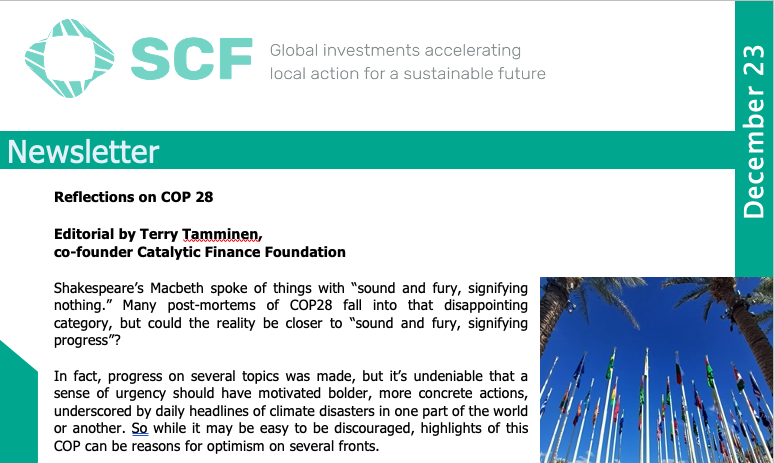Senegal
Country related projects
Senegal has adopted a new national policy for economic and social development. The vision of an “emerging Senegal in 2035 with a united society and a rule of law”, which emphasizes the fact that development actions must comply with the broad guidelines for mitigating and adapting to the effects of climate change, by integrating the principles of sustainable development into national policies.
Senegal’s vulnerability to climate change and other global challenges reflects a great urgency to act as well as the country’s growing needs for investments and innovations to improve its response capacity.
The assessment of the various impacts and vulnerabilities at the national level shows that all of the key sectors of the Senegal Emerging Program (PSE) all remain directly or indirectly exposed to the impacts of climate change.
Climate change thus appears to be a barrier for development and the fight against poverty. This represents a major challenge for achieving the PSE objectives by 2035.
Thus, Senegal has committed to its NDC, which is part of the prospective vision of the PSE, its strategy and development plans as well as sectoral programs for the sustainable management of its natural and environmental resources by 2020-2025. The priority sectors of the NDC are energy, industry, transport, waste, agriculture and forestry.
The Mitigation Component of the NDC provides for a relative reduction in GHG emissions of 5% and 7% respectively, by 2025 and 2030, compared to the baseline (Business as usual) for the unconditional objective of achieving activities with national resources (State, local communities, private sector, NGOs, etc.). This reduction could be increased to 23% and 29% respectively, by 2025 and 2030, compared to the baseline, if Senegal benefits from the support of the international community with substantial funding, the facilitation of the transfer of environmentally sustainable technologies and strengthening its institutional and human capacities in the area of climate change.
The objective sought through the implementation of adaptation measures, included in the NDC, is to increase the resilience of ecosystems and populations in the face of the impacts of climate variability and change. Based on temperature increase and rainfall decrease tendencies, specific adaptation objectives could be structured around three points: (i) Strengthen networks of observation and collection of climatic, oceanic and coastal data. (ii) Strengthen the resilience of ecosystems and production activities; and (iii) ensure the health, well-being and protection of populations against risks and disasters linked to extreme events and climate change.
The implementation of Senegal’s NDC is estimated at an overall cost of 13 billion USD of which, 8.7 billion dedicated to mitigation with 3.4 billion USD, unconditional, and 5.3 billion USD conditional; and 4.3 billion USD for adaptation, of which 1.4 billion USD is unconditional and $ 2.9 billion is conditional.
In terms of the impact of priority adaptation measures by sector, a simulation shows that the implementation of the “climate” projects of PAP PSE 2 will allow Senegal to respect the commitments contained in the unconditional CDN. The overall cost of the “climate” projects of the PAP PSE 2 is estimated at 3162 billion FCFA, while that of the unconditional NDC is 2734 billion FCFA.
Technical Assistance (TA) activities needed from SCF would mainly be about training and capacity building in the following areas:
- Waste and sanitation management;
- Renewable energy and energy efficiency infrastructure projects;
- Adaptive solutions based on nature;
- Agroforestry.
More specifically, training can focus on:
- Public-private partnerships (PPP);
- The identification, design and development of infrastructure projects that have an impact and can be financed;
- Access to green financing opportunities;
- MRV process (with the involvement of the actors concerned, in particular the Regional Committees on Climate Change – COMRECC).
In Senegal, technical assistance, including through capacity building is to be provided to support local authorities in the formulation, development and implementation of large-scale green projects involving several local authorities through inter-municipal cooperation in the following non-exhaustive priority sectors:
- Collection, treatment and recovery of solid waste;
- Sustainable management and treatment of wastewater;
- Protection, restoration and sustainable management of wetlands (for example niayes, mangrove ecosystems…), land and the valuation of ecosystem services through Adaptation ecosystems-based adaptation (EBA) or on nature;
- Agroforestry and the development of agricultural value chains and non-timber forest products;
- Flood management through the establishment of infrastructures allowing infiltration, groundwater recharge and water storage as nature-based solutions;
- Establishment of renewable energy and energy efficiency infrastructure;
- Support for small and medium-sized enterprises (SMEs) and small and medium-sized local industries (PMIs) in the development of projects relating to energy transition and the promotion of local products.
- Capacity building of the institutional framework of the Green Climate Fund (strengthening of the governance framework and development of a system of transparency, climate finance and adaptation and mitigation actions);
- Knowledge management and communication (capitalization of low carbon and climate change resilient strategies, communication, awareness and education).
Senegal’s strategic climate investments opportunities are mainly drawn from its country’s GCF program (2018 – 2022) based on two pillars:
- Energy and low-carbon investment (production and access to low-emission energy; promotion of low-emission transport, promotion and deployment of energy efficiency);
- Sustainable management and use of land and forests – strengthening of carbon stocks (sustainable management of forests and promotion of low-carbon agriculture);
- Strengthening the resilience of vulnerable communities and social protection (strengthening resilience to food, water and health insecurity and strengthening the protection of the livelihoods of individuals and communities);
- Resilience of infrastructures, habitats and natural ecosystems (promotion of a sustainable environment, habitat and infrastructures, management and restoration of ecosystems and ecosystem services);
- Provision of data and information for the country’s SCF profile (October 01, 2021).
- Starting of the preparation for the National SCF Consultations (December 08, 2021).




